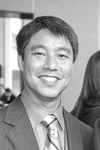
David Inoue
NASCAR driver Kyle Larson recently made headlines for using a racial slur while playing a video game that was being broadcast over the Internet. Larsen had been the face of diversity for NASCAR because of his Japanese heritage but is no longer, as he was appropriately let go by his sponsor days after the incident.
Days before this incident, Andrew Yang made headlines for his exhortation that Asian Americans prove their worthiness to be American citizens by performing patriotic deeds.
While the rebuke was swift and widespread for those words, what was perhaps glossed over was Yang’s reference to his brush with racism from “Three middle-aged men in hoodies.”
I don’t think anyone has a doubt about the skin color of those three men. As much as Facebook’s Mark Zuckerberg may try to promote the hoodie look, he is about as far from the stereotype as one can possibly get.
Larson and Yang highlight the tension that exists between the African American and Asian American communities. It mostly comes from the desire for any group to not be marginalized — to be a part of the majority, to belong, to be accepted. For most of the Western world, this means to be white.
Of course, the very concept of Asians as the model minority was created during the civil rights movement to pit Asian Americans as a contrast to the calls for fundamental human rights for African-Americans.
The intended message was that Asian Americans had succeeded, why can’t African Americans?
As we look back, the real message was, despite Asian Americans facing extreme discrimination, they were able to overcome it, why can’t other groups? And yet, in neither case did it mean all discrimination had or was going to be eliminated.
Unfortunately, for Asian Americans, the gain of limited acceptance came at the expense of the further disenfranchisement of African-Americans.
For many Asian Americans, the relative comfort of better acceptance than other minority communities, sometimes even within our own community, has lulled many into a sense of complacency about racism in this country.
COVID-19 has turned much of that on its end. Many more Asian Americans have felt the sting of racism stemming from misguided beliefs that Asians are to be blamed for the origins of the disease.
I remember when I was a child, probably in the fifth or sixth grade, and a younger student at the school came up to me in the hallway and called me a slur. I was shocked that someone younger than me would think they would have the power to do that, but that is how racism works.
It gives the person who wields it a perceived sense of power over the victim. Fortunately, I was surrounded by several of my classmates who stepped in right away and confronted the younger child. I remember the defense they gave was that I was more American than he was since I was older.
The defense given was pretty good for an elementary school student. But more importantly, they stood up as an ally.
What some Asian Americans are quickly realizing is that we need allies in our own fight against racism. But if we are to expect others to come to our support, we must also be there for others who face discrimination on the basis of race, age, disability, gender, sex, national origin, religion, as well as the intersection of one two or more of these and other categories that I have not listed.
We all want to be treated as equal Americans, but it cannot come at the expense of elevating ourselves as others are devalued. We also need to recognize that equality is not a privilege to be conferred upon us by those in power but our right as humans.
As we continue to be restricted from going out, think about who are the essential workers, those who stock the grocery stores and place their lives at risk. Are we valuing and paying them for the work they are providing? Or are we also exploiting them and devaluing them as humans choosing cheaper groceries and a lower pay.
These issues are all interconnected and laid bare by the current crisis we are in as a supposedly wealthy nation.
As a nation, we must begin to truly recognize and value the intrinsic human value of every person in this country.
David Inoue is executive director of the JACL. He is based in the organization’s Washington, D.C., office.



